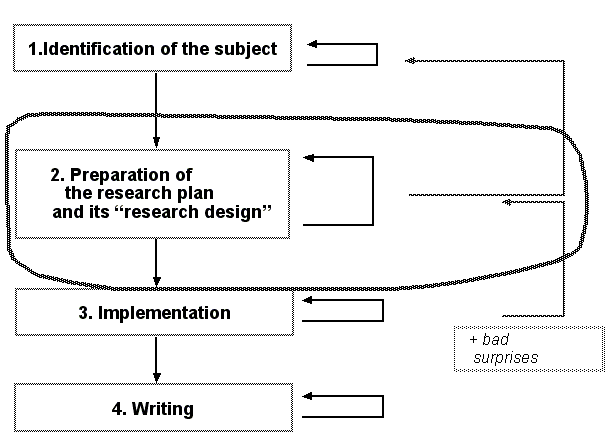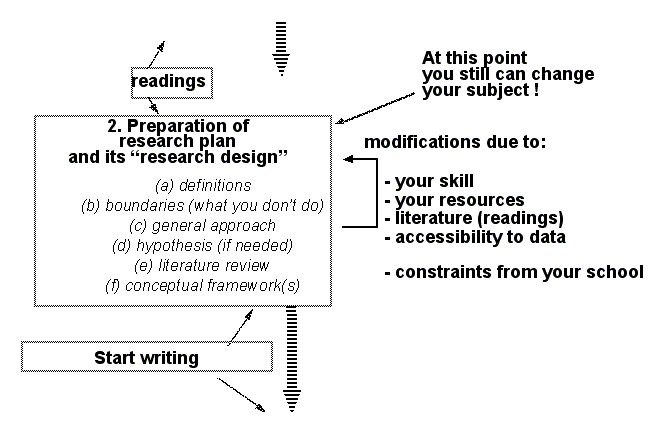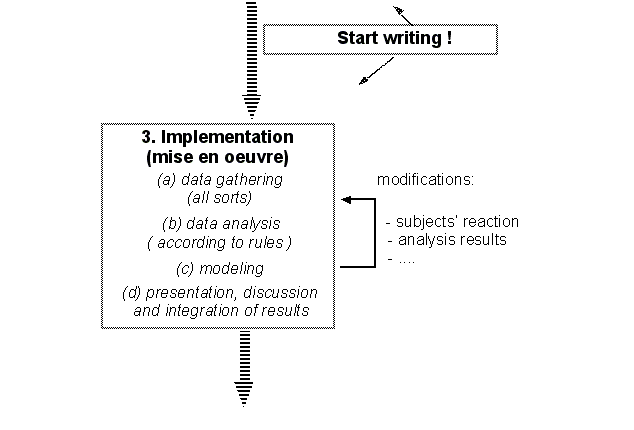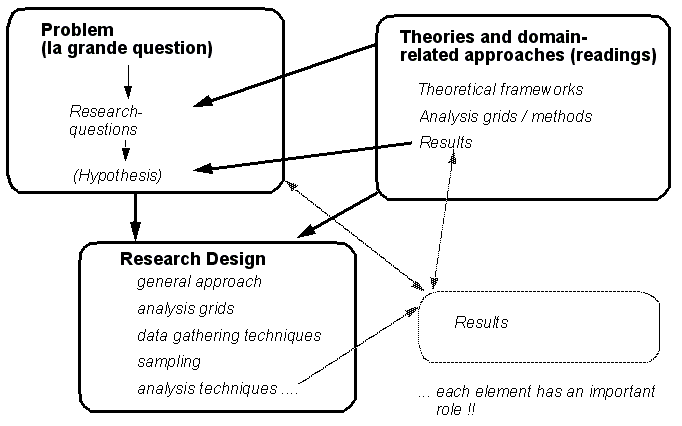Methodology tutorial - the research plan
<pageby nominor="false" comments="false"/>
This is part of the methodology tutorial
Introduction
This module provides your with a rather short overview of what we mean by "research plan". It will not help you to prepare a precise research plan, but just define the elements that should be part of a research plan ...
- Learning goals
- Know the typical elements of a research plan and understand their function
- Prerequisites
- Methodology tutorial - introduction
- Methodology tutorial - empirical research principles
- Methodology tutorial - finding a research subject
- Moving on
- Methodology tutorial - conceptual frameworks
- Methodology tutorial - theory-driven research designs
- Methodology tutorial - theory-finding research designs
- Methodology tutorial - design-oriented research designs
- Level and target population
- Quality
- More or less ok, but I will add some more real sentences (instead of bullets
Elements and place of the research plan
The research plan has to be defined in an early stage of your research. It explains the "what" and the "how" of your research.
Writing a serious research plan may have a strong impact on your [[research subject
- Important elements of the research plan
A research plan must include a few important elements, like important "definitions", the general approach, a literature review, conceptual frameworks, the research questions and maybe the hypothesis, etc. We shall discuss most of these in this module.
You also have to accept that you can not come up with a serious research plan in a single go, so be prepared to write/present several revisions that may include quite drastic changes.
Review Question: What crucial element is missing in the figure above ?
- Anticipation of main research activity
You can't write a research plan without having a clear picture of the work that is needed to implement it:
- Therefore be as explicit as you can (without being too verbose) !
- Be honest and leave nothing out !
Such a strategy will lower the risk of getting stuck and also help you to estimate resources (basically time) you will need !
The rest of this modules will look the principal elements of a research plan.
Elements of a typical research plan
Important notice: You may have to adapt this list to fit formal requirements from your institution. In addition methodology constraints will tell you how to organize these elements. As you will see later, various research types are implemented with somewhat different logic and that will translate to a different form of presentation.
Element: Your research subject
At the very beginning you must must state "the big question", i.e. the general subject in one sentence if possible and in the same paragraph add a few sentences that demonstrate its theoretical and maybe practical interests.
You also can make explicit your motivations and what your are not going to do.
Element: Objectives of your research
Say clearly what you wish to achieve, because this will determine your research questions and/or hypothesis and that are usually presented after the review of theory.
If appropriate, you can show if/how you plan a valorization activity , e.g. how you plan to transfer results to a "real context".
Element: Theory (review of the literature)
After the introduction that defines the general subject and the objectives you should produce a short and synthetic text describing and discussing the "state of the art" in your subject area. This is called a literature review.
Some advice:
- Be sure to mention the major publications concerning your subject. Read the ones you quote from !
- You may point out inconsistencies and gaps, which adds additional interest to your project
- Identify theories and conceptual models that you will use to do your empirical research.
- Maybe add your modifications and present both at the end of the review
- Make sure that you define all the concepts
- A lot of concepts are controversial, e.g. pedagogical effectiveness, efficiency, ...
- Only introduce theory that is relevant for your research
- Make sure to write a synthesis and not just a simple linear collection of uninteresting summaries. Each section of your theory part should end with a conclusion that you later can use to justify your research questions.
See the advice in readings and ideas and then make sure to read Methodology tutorial - conceptual frameworks too !
Element: Research questions and/or hypothesis
Research question will make explicit your research subject and objectives. These questions are the most important element in the research plan.
You can choose from various styles (or combine them):
- Open research questions (but make an effort to be as precise as possible).
- Research questions formulated as working hypothesis.
- Real hypothesis that are based on theory.
- In theory-oriented research, formulate hypothesis that postulate causalities
- Bad: "I postulate that my e-learning design will work"
- Good: "Conditions for successful implementation of an e-learning design in the context XXX of are ....."
- Bad: "ICT doesn’t work in schools"
- Good: "Critical variables A, B, C for successful implementation of e-learning are ...". Then, make explicit A, B, C as causal rules.
It also possible to adopt a hierarchical presentation:
- 2-7 principal research questions
- Explicit subquestions or hypothesis for each
Element: Approach & methodology
After having defined your research questions, you should give description of your overall approach (for example "experimental design", "survey study", "usability study", "instructional design" if hasn't been done in the introduction.
Then you will have to become more specific, e.g describe all planned data gathering and analysis techniques (for example, semi-directive interviews, content analysis ...)
Note: Make sure to explain your methodological designs for all levels of analysis !
- at the organizational level (if you are interested in this question),
- at the individual level (e.g. students, teachers)
Basic principle:
- Show convincingly how you are going to answer each research question !
- Obey guidelines dictated by the general approach
- in particular: be careful with experimental designs (rules are strict !)
Approach
- Briefly describe the overall approach you are using
- Discuss analysis grids that will measure important concepts
- You also can discuss conceptual frameworks (if not done before)
- For experimental studies: clearly describe the experimental conditions
Measures and material
- Data gathering techniques: (interviews, observations, surveys, ....)
- Sampling strategies (or justification of singular case selection)
- For qualitative in-depth studies
- sampling of interviews, events, etc.
- For experimental studies
- there is a strict way of doing things ! You have to describe in detail experimental conditions, materials used, sampling conditions etc.
Analysis
- Shortly describe analysis techniques (both qualitative and quantitative)
- If necessary: point out which methods need development (e.g. analysis of student-student interaction in a CSCW environment)
Element: Information sources
- Bibliography (use a real standard, like APA !)
- Documents to analyze
- Information interviews, etc., ....
Element: Work Agenda
Some planning can help. The minimum you should do is to make a list of the major steps:
- Delivery date - Final research plan
- Delivery date - Good draft of the literature review
- Delivery date - Data gathering I
- Delivery date - Data analysis
- Delivery date - Writing the rest / First draft
- Delivery date
If your research includes several case studies, you should modify accordingly.
See the module Methodology tutorial - planning techniques for more details.
Important: A research plan tells what your are going to do and how. It is not a chronological listing of activities. It just will include such a thing (no more than 1/2 - 1 pages !).
The research plan is a whole
Now let's recall a few fundamental principles.
Major elements must be linked together
Recall: Research plan = what + why:
|
What ? |
A good question ! |
|
|
A (or more) good conceptual framework(s) |
| |
|
How? |
Consider that your research plan should be ... |
|
|
Be realistic !Prove that you have ... |
| |
|
A whole ! |
Integration ! |
|
Checklist for the research project
Before you believe that your are done, check again:
- Theoretical feasibility
- You can’t do it all by yourself, check the literature (if not already done so, find overview and "ground breaking" articles)
- In particular: theoretical frameworks, analysis grids, theoretical statements.
- organize an interview with a least an academic and a domain expert
- Inventory of approaches and methods
- There exist constraints, you can’t study everything in any way (but you do have choice, but check with your advisor !)
- finding a good design always is an iterative process (so don’t worry if your first version looks bad)
- Identify your main approach :
- Look at similar research
- Remember, if you want to "prove things" and make causality claims, you need comparison !
- Use qualitative approaches to explore and to understand, quantitative approaches to confirm, generalize, prove, ...
- Methodological feasibility
- Dress a list of all the concepts that appear in your research questions (and hypothesis if you have)
- Take each concept apart for its dimensions,
- Operationalize each empirical dimension (make it is measurable)
- Does your theory part really relate to your empirical / practical part ?
- Make sure that you can produce needed data and then analyze them
- do you know how to gather data (make observations, design questionnaires, make interviews, ...
- Check your skills and resources
- Can you handle these data ?
- Do some planning



